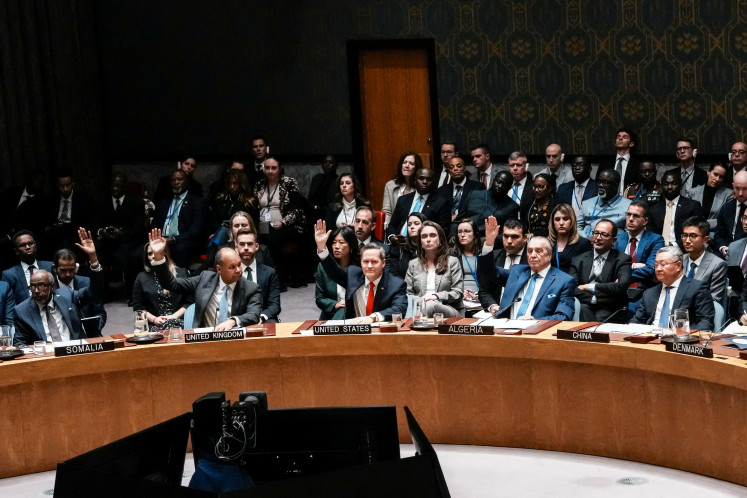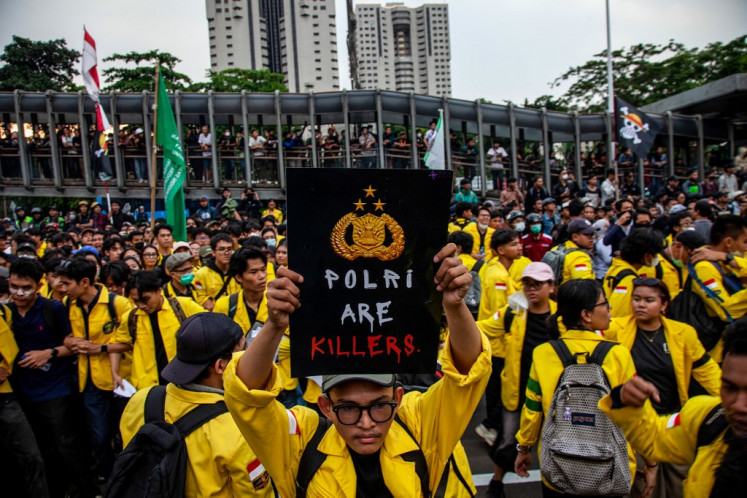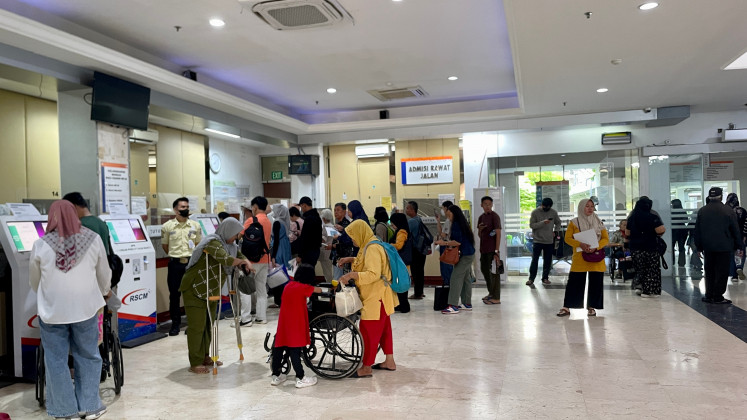Popular Reads
Top Results
Can't find what you're looking for?
View all search resultsPopular Reads
Top Results
Can't find what you're looking for?
View all search resultsArtificial corneal transplant proven to correct corneal blindness
For eyes: Leonard Ang checks eyes of a patient in his clinic in Singapore
Change text size
Gift Premium Articles
to Anyone
F
span class="caption" style="width: 398px;">For eyes: Leonard Ang checks eyes of a patient in his clinic in Singapore. Courtesy of Leonard AngCorneal blindness is the second commonest cause of treatable blindness in the world after cataract, with more than 20 million cases globally. While conventional corneal transplants can successfully restore vision in patients by replacing the diseased cornea, there is always a risk of cornea graft rejection and failure.
There are many severe cornea diseases such as chemical burns, Stevens-Johnson syndrome, where conventional corneal transplantation is associated with a high risk of graft failure.
When the cornea grafts fail, patients lose their sight again. A repeat corneal transplantation is associated with a significantly higher chance of rejection and failure and these patients often require immuno-suppression which can cause serious systemic side effects. More than 90 percent of third time repeat grafts would fail within three years. Many of these patients become blind again when the repeat grafts fail.
Until recently these patients remained blind because there were no good treatment options available that could provide good long-term results. A revolutionary new and improved method of cornea replacement is now able to restore good long-term vision for these patients and this gives them hope of regaining their sight and improving their quality of life.
The Boston keratoprosthesis (artificial corneas) is a new and improved method for treating blinding cornea disease. Said to be the best artificial cornea implant in the world, it can effectively restore vision in patients with severe blinding corneal diseases, including patients with high-risk corneal grafts and where previous corneal transplants and treatment have failed. In severe blinding corneal diseases, the Boston keratoprosthesis implantation may be the best option for restoring long-term vision in these patients.
The Boston keratoprosthesis is a collar button shaped device consisting of a PMMA [poly(methyl metacrylate)] optic that clamps within it a donor ring of corneal tissue and is stitched in place into the recipient eye. It creates a very clear window through which patients can see clearly.
Being a highly specialised and complex procedure, only a few surgeons in the world are specially trained to perform the operation and follow up these patients. The follow-up is also critical to ensure good long-term visual outcomes and to minimise complications.
Due to the very specialised nature of the operation, this surgery is not available in many parts of the world, including other South East Asian countries. As such, millions of people around the world with cornea disease continue to suffer with poor vision throughout their lives.
The Boston keratoprosthesis has many advantages and benefits over conventional corneal transplants and other cornea surgeries, such as patients can benefit from good long-term vision, because it eliminates the problem of graft rejection and failure and visual recovery is much faster than conventional corneal transplants.
This procedure eliminates the need for systemic immuno-suppression and steroids, which means less harm to the body and reversible and may be easily repeated. There is less irregularity and astigmatism, meaning lower spectacle correction required. The cosmetic appearance is desirable.
Who would benefit from this surgery?
The Boston keratoprosthesis is the procedure of choice for patients with severe and complex cornea diseases, previously failed cornea transplants and treatment and destructive eye surface disease and loss of stem cells due to chemical injury, severe inflammation and scarring.
Even the most severe and complex corneal diseases can be treated with it. The Boston keratoprosthesis may also be used in patients a wide range of cornea diseases that is impairing the visual, such as: cornea infections, inflammation and injuries which result in corneal scarring; swelling and cloudiness of the cornea due to damage or ageing of the innermost layer of cells of the cornea (known as the corneal endothelial layer); hereditary cornea diseases; and used to treat children with congenital or hereditary cornea diseases.
The first series of Boston Keratoprosthesis operations in Singapore has been performed by A/Prof. Leonard Ang. The surgery was successful in all patients. All patients were initially blind before surgery, and after surgery, all patients were able to achieve at least 90-95 percent of their visual potential. 90 percent of patients achieved excellent vision after surgery.
These results demonstrate the Boston Keratoprosthesis is an excellent procedure for treating corneal diseases. This operation offers new hope for restoring vision in patients with severe blinding eye diseases.
54-year-old Mr. Ko from Indonesia suffered from severe damage to the cornea and eye surface associated with stem cell deficiency, and had been blind for many years. He was unable to be treated in Indonesia and came to Singapore for treatment. He previously underwent a cornea transplant in January 2008, and this failed within three months after the surgery. Since then, he remained blind as there was no satisfactory treatment available in the region. He was not able to find suitable treatments anywhere else and recently heard of Dr. Ang performing this new artificial cornea transplant operation.
He flew in to Singapore to see Dr. Ang for this treatment. He underwent the Boston keratoprosthesis surgery and reconstruction of the entire eye surface on Aug. 2, 2011. The complex surgery took four hours to complete. Prior to surgery, he was completely blind in this eye. Following surgery, he has achieved extremely good vision (6/7.5, near perfect vision) within one month after surgery.
“Previously, I needed people to help me cross the road. Now, I can help others cross the road,” he said in Bahasa Indonesia.
Dr Leonard Ang is the medical director and senior consultant at The Eye & Cornea Transplant Centre (TECTC) and the Premium Lasik Surgery Clinic (PLSC). He specialises in cataract surgery, cornea & ocular surface disease treatment, corneal & stem cell transplantation, and refractive surgery (LASIK, Epi-LASIK, Implantable Contact Lens). He also treats patients with glaucoma and various retinal diseases.
















